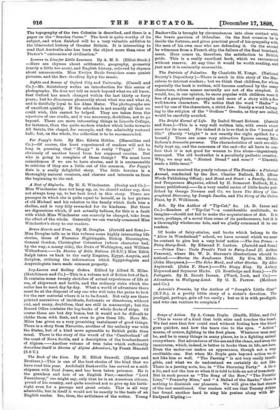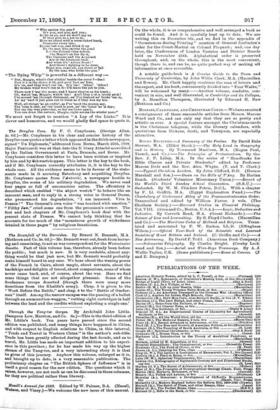Songs of Action. By A. Conan Doyle. (Smith, Elder, and
Co.) — This is verse of a kind that both stirs and touches the heart. We feel sure that few could read without feeling how the blood goes quicker, and how the tears rise to the eyes. " Action" means, of course, fighting in the first place. Whatever man may be, and he is many things in many places, he is a fighting animal everywhere. But adventures of the sea and the chase, and even the racecourse, which, indeed, is better in books than in life, are here. Even the motor-car makes an appearance, though not a very creditable one. But when Mr. Doyle gets beyond action we do not like him so well. " The Passing " is not very easily intelli- gible, and what we do understand we certainly do not like. There is a jarring note, too, in "The Storming Party." A lie is a lie, and not the less so when it is told to hide an act of treachery. But in such poems as "The Song of the Bow," "The Frontier Line," " Pennarby Mine," and " A Ballad of the Ranks," there is nothing to diminish our pleasure. We will give the last stanza of the last. mentioned. Our readers will see that Tommy Atkius has found another bard to sing his praises along with
Rudyard Kipling :—
" Who carries the gun ?
It's you, and you, and you; So let us go, and we won't say no
If they give us a job to do.
Here we stand with a cross-linked hand,
Comrades every one ; So one last cup, and drink it up
To 'he man who carries the gun!
For the Colonel rides before, The Major's on the flack, The Captains and the Ad jutant Are in the foremost rank.
And when it's' Action front!'
And there's fighting to be done, Come one, come all, you stand or fall By the man who holds the gun."
The Dying Whip" is powerful in a different way
But, Maggie, what's that elinkin' beside the cover f—See 1 Now it's in the clover fiAd, and goin' fast an' free, It's 'ire, and they don't see 'im. It's 'im 'Alloo I 'ARoo I
My broken wind won't run to leave the job to you.
There now I 'ear the music, and I know they're on his track ; Oh, watch 'em, Maggie, watch 'am I Ain't they just a lovely pack I I've nursed 'em through distemper, an' I've trained an' broke 'ens in, An my 'eart it just goes out to them as if they was my kio.
Well, all things 'as an endize, as I've 'eard the parson say, The 'ors. is cast, aa' the 'ound is past, an' the 'anter 'as is day; But my day was yesterday, so lay me down again,
You can draw the curtain, Maggie, right across the winder pane."
We must not forget to mention "A Lay of the Links." It is clever and humorous, and we would gladly find space to quote it.











































 Previous page
Previous page